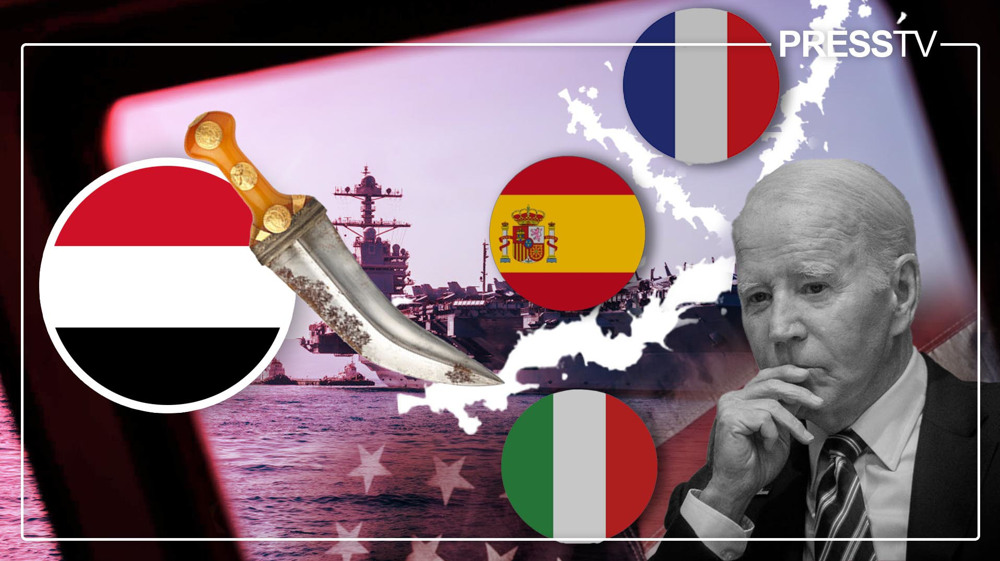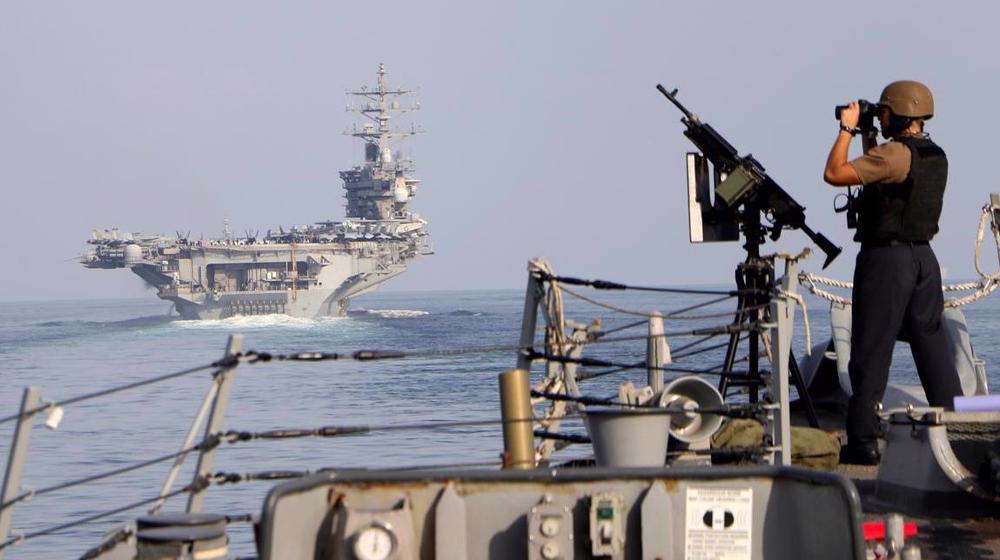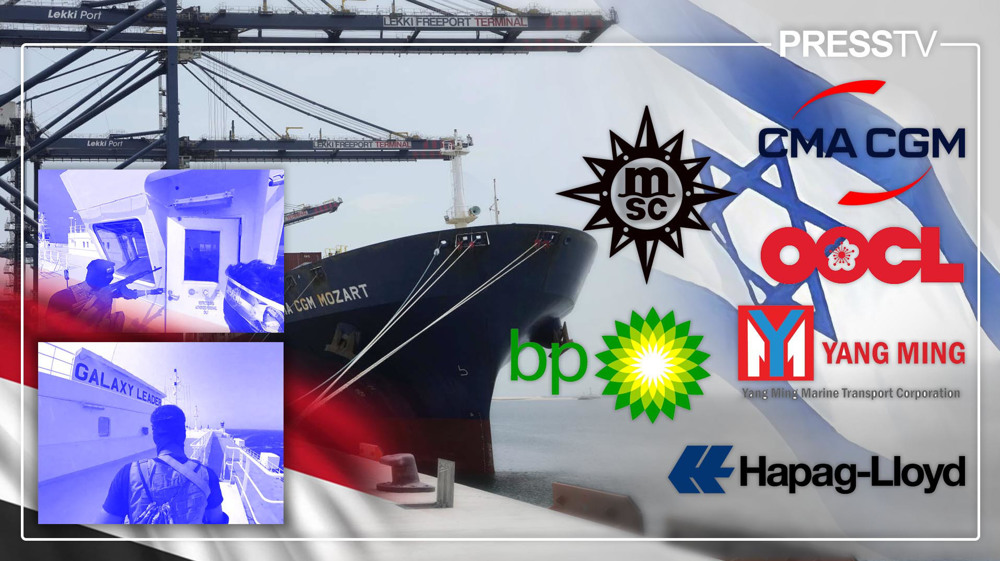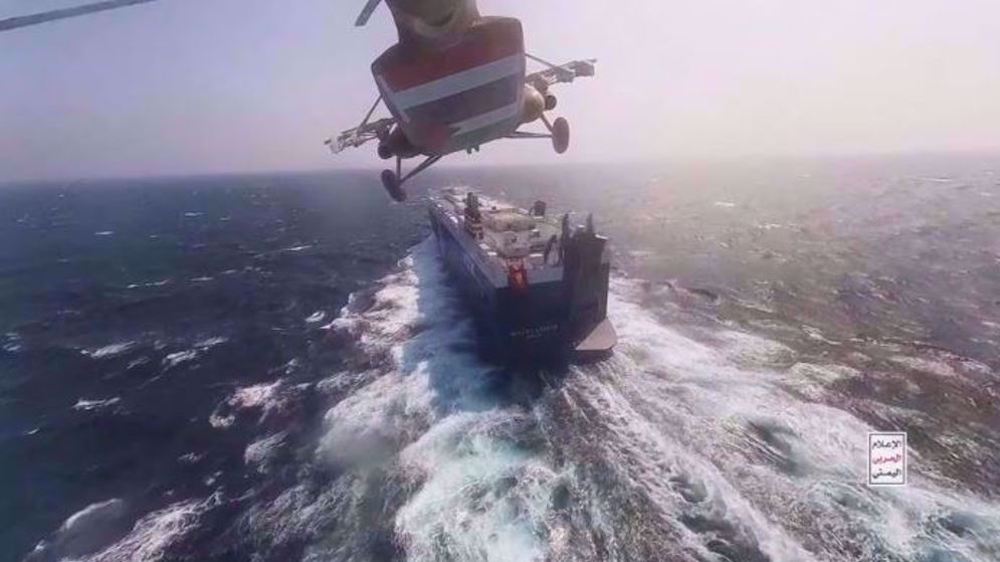Breakdown before takeoff: US-led Red Sea alliance crumbles under Yemeni dagger
By Ivan Kesic
After the request to join the US-led maritime alliance dubbed ‘Operation Prosperity Guardian’ was turned down by China, as well as the traditional Arab allies, Egypt and Saudi Arabia, Washington has now also faced the snub from European allies, France, Italy and Spain.
In solidarity with Palestinians who have been reeling under the fresh Israeli military aggression and siege since October 7, Yemen carried out a series of attacks on Israeli-linked ships off its coast in the Red Sea, rattling both the Zionist entity and its Western backers, especially the US.
To deter and bully the Yemeni military on behalf of the dying regime in Tel Aviv, the United States last week announced the ten-nation ‘Operation Prosperity Guardian’ alliance in the Red Sea.
The countries that initially pledged support to it included the United Kingdom, Bahrain, Canada, France, Italy, Netherlands, Norway, Seychelles, Denmark, Spain and Greece.
Western economic concerns
The Yemeni operations in the Red Sea – which is key to the global maritime trade – have created a massive problem for the Western economy, which is highly dependent on the import of energy, raw materials and finished products from Asia via the sea route that passes through Bab-el-Mandeb.
Due to the recent escalation, many of the world's largest shipping companies have decided to avoid Bab-el-Mandeb and use an alternative sea route around Africa and the Cape of Good Hope.
This route adds 3,200 miles and nine extra days of travel on a typical journey between Asia and Europe, which makes it a much more expensive option compared to the shorter Suez route.
The additional fuel charges for the journey generally run more than $30,000 per day, depending on the vessel, or around $300,000 total for the longer trip.
Commercial carriers have thus already introduced a $700 surcharge on each container sailing the longer route, and typical ocean container ships, depending on size, carry from 3,000 to 24,000 containers.
Considering this, it is estimated that the additional price for the flow of Asian goods to Europe will rise to $2 billion per month, which in turn would fuel a higher final price and inflation in the West.
In addition to extra costs, longer shipping times imply delays in delivery, shortages and general disruption of national economies, thus multiplying the problems.
US-Israeli naval alliance
All of the problems cited above can be avoided if the United States follows Yemen's advice and forces the Israeli regime to end its genocidal campaign against Gaza.
However, Washington, which has demonstrated its direct complicit in the Israeli war on Gaza, is clearly not interested in de-escalation, which is why it announced a naval coalition with allied countries.
This shaky alliance has Israeli roots, as the announcement of its creation came in the same week that Israeli regime premier Benjamin Netanyahu asked US President Joe Biden to “stop” Yemen.
US Secretary of Defense Lloyd Austin announced that they were negotiating with several countries to create the broadest naval coalition aimed at "protecting freedom of navigation."
According to the initial announcements, this group sounded spectacular because it was supposed to include a fleet composed of warships from at least ten countries, headed by Washington.
Worldwide rejections
It was even supposed to be wider than Western, because the Pentagon imagined that China, a country that exports massively to Europe and North America via that sea route, would join the coalition, but Beijing flatly rejected the proposal.
Refusals also came from two traditionally friendly Arab countries as well as major navies straddling Red Sea shores, Saudi Arabia and Egypt, which have said they have no interest in engaging the fraternal Arab country in the south.
Disappointments for American war-mongers did not end there, as major ally Australia also refused to jump on the anti-Yemen bandwagon, saying that it was not ready to send its warships to the Red Sea.
The final blow was confirmed when European NATO members, France, Italy and Spain, also refused to send their vessels to the US-led coalition and said that they would only operate under the command of NATO or the EU, not the United States.
France's Defense Ministry explicitly said his country’s ships would stay under French command and did not say if they would deploy more naval forces.
Italy's Defense Ministry said the country would send the naval frigate Virginio Fasan to the Red Sea to protect its national interests, as a response to specific requests made by Italian shipowners, not the US.
Spain's Defense Ministry said the country would only participate in NATO-led missions or EU-coordinated operations. "We will not participate unilaterally in the Red Sea operation," it said.
Of the loyal American allies who have decided to officially participate in the coalition, Canada will send three staff officers, the Netherlands two, and Denmark one.
Additionally, Seychelles offers its participation to "providing and receiving information," without deploying any vessels or personnel, and Bahrain offers headquarters.
The reasons for the worldwide refusal to participate lie in the fact that all countries are aware that the US-led coalition is only a cover for the protection of Israeli interests.
And, more importantly, they realize that the Yemeni military is not a ragtag army anymore. It is a force to reckon with, possessing the most advanced military weapons in the region.
Yemeni Defense Minister’s warning that they would turn the Red Sea into a “graveyard” of the US-led alliance if it goes ahead with the provocative plan evidently prompted the change in plans in the West..
Hamas thanks Iran, Resistance Front following achievement of ceasefire in Gaza
'Capitulation': Israeli officials and media concede Gaza defeat as truce unfolds
'Gaza has won': Social media users react to ceasefire with mix of relief, joy
Iran seeks South Korea’s assistance for AI, fiber-optic projects
VIDEO | Iran's 'Eqtedar' (Power) maneuver
Israel hits HTS military target in Syria for 1st time since fall of Assad
VIDEO | Press TV's news headlines
Israel has slaughtered 13,000 students in Gaza, West Bank

















 This makes it easy to access the Press TV website
This makes it easy to access the Press TV website